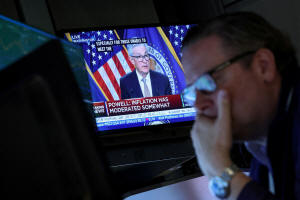Would Fed's Powell go full 'loathsome' to buffer against a debt default?
 Send a link to a friend
Send a link to a friend
 [May 04, 2023] By
Howard Schneider [May 04, 2023] By
Howard Schneider
WASHINGTON (Reuters) - Federal Reserve Chair Jerome Powell, asked on
Wednesday about what the Fed would do in the event of a U.S. debt
default, repeated the mantra of Fed leaders on that issue: A default is
unthinkable, the U.S. government needs to pay its bills, and there was
little the central bank could do to prevent an economic meltdown if it
didn't.
"No one should assume that the Fed can really protect the economy and
the financial system and our reputation globally from the damage that
such an event might inflict," Powell said.
Unsaid, however, is that just over seven weeks ago Powell showed - again
- how willing he is to race beyond the red flags of central banking if
the moment calls for it.
As a member of the Fed's Board of Governors a decade ago, Powell called
certain possible debt default responses by the Fed "loathsome." Yet
following the March 10 failure of Silicon Valley Bank the Fed took steps
that resembled what it might also do with defaulted U.S. debt - agreeing
to accept impaired securities, at face value, as collateral on loans to
banks.

The move broke a longstanding maxim of central banking that collateral
is accepted only at reduced value to minimize the moral and financial
risks of offering such loans. But it also helped curb possible financial
turmoil on the reasonable assumption that the U.S. government would
ultimately pay the full value of its Treasury bonds and bills even if
they, for a time, traded below par.
Accepting defaulted securities as collateral for Fed loans, or swapping
"good" federal debt already held by the Fed for impaired debt held by
private investors, would be an extreme variation on the theme - yet one
that may prove less "loathsome" than the alternative economic collapse
some predict would follow a default.
To a bank, carrying "underwater" investments can be catastrophic, as the
recent collapse of Silicon Valley Bank demonstrated. To a central bank,
with no budget constraint and an elastic time horizon, it's just a
matter of waiting out the politicians.
The program set up by the Fed in response to the SVB failure makes the
line between defaulted Treasury securities, on which a payment has been
missed, and others, "pretty indistinct," said Vincent Reinhart, a former
top Fed staffer and now chief economist at Dreyfus and Mellon, now that
any Treasury issue could in theory be used at face value to secure a
loan from the Fed.
"They are just not going to be specific about what they will do because
it validates a hypothetical they don't want to consider," he said.

[to top of second column] |

Traders react as Federal Reserve Chair
Jerome Powell is seen delivering remarks on a screen, on the floor
of the New York Stock Exchange (NYSE) in New York City, U.S., May 3,
2023. REUTERS/Brendan McDermid/File Photo

LAPSED CENTRIST?
Powell joined the Fed in 2012 from a think tank where he focused on
debt and deficit issues. He was a centrist at first uncomfortable
with the central bank's aggressive forays into quantitative easing,
the massive purchases of government bonds and mortgage-backed
securities which expanded the Fed's balance sheet as well as its
presence in private financial markets to fight off the 2007 to 2009
financial crisis.
QE was at the time considered "unconventional" policy that many felt
would be tucked away at some point, and the Fed's balance sheet
shrunk back to more traditional levels.
But the Fed of 2023 - post-pandemic and post Great Financial Crisis
- is a different institution than the one overseen by chairs like
Alan Greenspan or Paul Volcker, and different even than the one
Powell joined.
QE is now integral to the Fed's playbook, and its $7.8 trillion
balance sheet central to how the Fed manages interest rates and
monetary policy.
Powell, chair since February of 2018 after he was promoted by
then-President Donald Trump, has shown a repeated willingness to
throw aside old practices when he felt it was necessary - even
noting, in interviews early in the pandemic, that he had blown
through traditional guardrails when the Fed, for example, agreed to
intervene in private bond markets.
He might not think central banks in theory should be buying the
bonds of private companies; but if the alternative was a deep
economic depression, purity could wait.

On the eve of what would prove a disruptive outbreak of inflation,
Powell in the summer of 2020 adopted a years-in-the making effort to
shift the Fed's policy focus to put less weight on its price mandate
and more on its goal of full employment, correcting what he had come
to believe was a policy bias that kept more people out of work than
was needed to keep inflation stable.
The judgment proved controversial once inflation began its breakout
run in 2021. Powell adapted, again, spearheading an aggressive round
of interest rate hikes to control inflation and stating his
willingness to pay the cost as needed in rising unemployment.
A debt default may pose another tough decision for a Fed chair who's
motto could well be to never say never.
(Reporting by Howard Schneider; Editing by Andrea Ricci)
[© 2023 Thomson Reuters. All rights
reserved.]
This material may not be published,
broadcast, rewritten or redistributed.
Thompson Reuters is solely responsible for this content. |